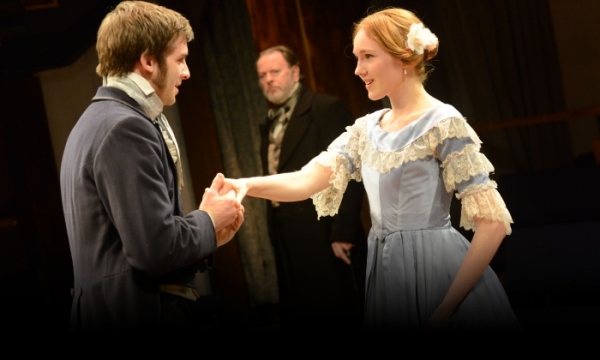The School for Scheming (Orange Tree Theatre)
Oliver Gomm shines in this Victorian comedy directed by Auriol Smith

This gloriously farcical Victorian comedy, directed with wit and pace by Auriol Smith, draws on a panoply of traditions and conventions, with plenty of mistaken identities, abrupt changes in fortune and a surprising star turn by a delightfully nonchalant dog.
Beginning in the rather dour boarding house of the aptly-named Sally Singleheart (Elizabeth Healey), the plot soon thickens with so much devious financial trickery that Ponzi himself would look positively saintly in comparison. Having lost his fortune, and left with only his family name to trade on, Claude Plantagenet (Paul Shelley) must marry his beautiful daughter Helen (Imogen Sage) to the highest bidder in order to save himself from the ignominy of the debtors’ prison. His path is made rockier by a wonderful cast of stock characters, from fop to knight errant, each with their crosses to bear and their own quandary to face: money and status, or love and honour?
Boucicault’s script flits spiritedly between passion and politics, peers and plebeians, dragging our damsel in distress through several abortive engagements in her quest to discover whether she will be more fulfilled as a lonely countess or a loved-up commoner. The use of asides, sharply delivered to the upper balcony, generates endless humour as the characters continually emphasise their own deceptions and dilemmas, and waste no opportunity to engage the audience (seated in the round) with a little ironic eye-rolling or the odd moue of distaste. The result is a warmly intimate and immensely enjoyable piece in which the audience feel very much part of the action.
The cast are superb, rattling through the complex and often wordy dialogue which, without doubt, poses challenges for actors and audience alike. Oliver Gomm is luminous as lisping Lord Fipley, whilst Shelley commands the stage in his role as the deceptive yet charming Plantagenet. Tony Turner, as moneylender XY, plays a pivotal role, turning up like a bad penny and facilitating much of the farce, and Sage, who is still at drama school, is a picture of measured composure as the ingénue-turned-schemer.
A wry, self-referential humour extends throughout, including through the (slightly laboured) scene changes, and many of the laughs are as fresh today as they would have been in 1847. Overall, a charming, pacy and lively evening with plenty of belly laughs and a few heart-warming morals thrown in for good measure.












